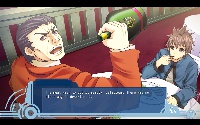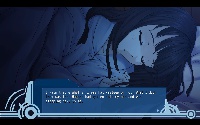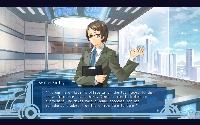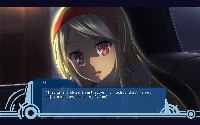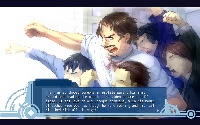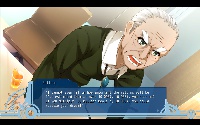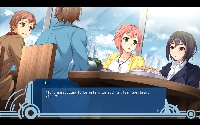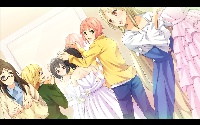World End Economica
Playtime: 21.4 Hours
Finished 08 July 2023.Finished all 3 parts within the span of about a week. Played on the Steam Deck; I'm not quite sure if I own the old or new version since I either bought or received the game many years ago, and the UI did not match the one found on the Steam page. Also, there were a number of other wonky bugs and the keyword tips in Part 3 had quite a bit of jank to them so I have to imagine they would have fixed this stuff up for the newer Switch/PS versions. Thankfully, my experience was perfectly fine because of the reassignable controls on the Deck, and there were no other issues aside from the typical intro/credits movie playback problems so I didn't miss anything of note.
This VN realizes the potential of the medium in a way I wish would be explored more frequently, using it to tie the depth of a subject like economics and stock trading to an intimate story about dreams and growth, with just a little romance involved. Unlike so many other novels that set up a premise mostly to provide a backdrop for a love story, this series focuses on 3 separate economic crises front-and-center, with budding relationships mostly left silently budding in the background and only mentioned in passing when they happen to be relevant. At the same time, this game distinguishes itself from many other action-heavy VNs in that there is no violence, death, or disaster in the physical sense; in the place of verbose sword-swinging scenes are pointed, technical analyses of market conditions, investor sentiments, and deliberated solutions. In this sense, unlike so many other VNs that drag out the same tired subjects like music, art, club activites - subjective fields where a description of "mastery" can be waived away with broad statements without any true depth - this story spared no effort in properly detailing the technical details and context surrounding each crisis. Perhaps ironically, I don't think it's purposeful to say much more on this because they are explained much better in the story itself than I ever could here.
Probably the first noteworthy note about this series is that it consists of 3 parts, each one advancing 4 years from the end of the previous game and focusing on 3 separate major turning points in Hal's life, though they are all closely linked through the characters. The timeskips gave room for the characters to grow towards their respective destinations, as you see their dreams change relative to their surroundings. Nowhere else is it more clearly shown than in Hal himself, who starts as a bit of a rude, brash teenager loner with a dream as big as his ego. Throughout the second and third parts, you bear witness to his recovery and redemption of his dream, and a final re-evaluation of where his goal was all along. These changes bring a life and dynamism to his character that is uncommon in the genre; even in the opening minutes of part 1, you never feel like he's meant to be a stand-in character for the player's whims. However, noting that the entire saga amounts to just above 20 hours, there are are some significant compromises made, some of which I feel impact the overall strength of the games. Running for an average of only ~7 hours each, the pacing felt very rushed in the second and third parts, which should have gotten some more runtime to flesh out their worlds a little better. For example, there are several characters and plot threads that are simply terminated in part 3 for seemingly no reason other than to constrain its length, like the housing projects, medical reports, several other minor characters. Additionally, a more extreme downside is that every part ends on a cliffhanger, cutting right before the resolution and fallout of the climactic event, usually ending on some minor and/or inconsequential scene instead. I consider this a really cowardly way of writing, as if afraid of following through with their commitment to the storyline, perhaps unsure if the written solution would be considered financially sound by readers.
The general brevity of the games ultimately leads to a min-maxed feeling in the script, which has its strengths and weaknesses. I think there was some serious effort during revisions to pare down the script as much as possible without losing any critical details; at every turn, any detail I questioned turned out to have a precedent on deeper thought. So many seemingly minor interactions in the first and second parts lead to payoffs in the third, yet there is very little fluff added; most everything must have its purpose. Once I started picking on that, I started to find character interactions increasingly sterile and hurried in almost every instance outside of the economics talk (which is ultimately the centerpiece of the game, to be fair). In stark contrast, there are also many loose plot threads that were awkwardly terminated. Hal's parents and their relationship with Hal and Chris (who lives with them betwen parts 1 and 2) is never explained beyond a couple of comments per part. Rena, Le Goff, and Serrault (among others) simply disappear as soon as their brief moment of relevance is over. This is especially bad in part 3 as previously described, where several plot threads are never properly closed, nor even referenced in the ending - as if they were supposed to be a buildup to a possible 4th part? Another way I've started to think about the style of writing in this game is that it feels very experimental, almost as if every part was written introducing many different ideas, characters and threads with no definitive purpose in mind to be resolved when writing the next segment of the story. In that sense, it's somewhat magical that the trilogy ends up feeling as complete as it does. Maybe Rich Tears or Eagle might come back in a prospective part 4 if one is ever made.
Despite all of my other comments praising the emphasis on story over relationships, I think the way the characters develop themselves and their connections to each other is also a highlight of the series, mostly taking place during plot-heavy segments. As I've already gone over, Hal's development from petulant teenager into a focused adult with a world perspective advanced beyond the avarice of his younger self cements the influence of his finest quality on the series; his ability to perceive humanity in himself and in others. It's what gave him the edge above other investors in part 1, what gives him the final push to help Eleanor in bring justice to Avalon, and how he finally manages to re-evaluate himself in the third, prioritizing a chance at redemption and happiness, pushing aside his hunger for the abstract goal of Mars. In contrast, Lisa is probably the most consistent character in the series and the backbone foiling Hal's changes all the way, giving him the reasons and the nudge he needed to learn to be a better person. On the other end, I'd say Chris evolves along a path opposite to Hal, growing increasingly hungry for money and vestiges of influence while ironically being unfortunate enough to get completely sidelined in all 3 of the games, by either Hagana or Eleanor. I feel like her existence is justified in the game for only 2 reasons - to serve as a way for the player to gauge Hal's growth as a person by judging his increasing incompatibility with Chris, and to serve as a reference point for the player to see how much better Hagana and Eleanor are for Hal. It's quite pathetic really; I wish she had more redemptive qualities but I think that would ruin her purpose as a warning against greed; she's rich but at what cost?
Continuing on, Barton (or whatever other alias he uses) is a really interesting character, and generally the antagonist of the series. I found him really interesting because he is truthfully very difficult to hate. Firstly, he tends to be very truthful and straightforward in each game - in the first, Hal's big mistake was committed when he decided to try insider trading, something that Barton caught onto quickly and twisted to his advantage by sensing Hal's desperation. Even in the 2nd and 3rd parts, he is driven by a larger goal, similar to Hal; his belief is that Emerald Industries should not be able to act as a monopoly controlling the cities and their inhabitants, and should be broken down to promote competition instead - not a particularly ignoble dream. His happiness is derived through considering the Moon a playground for investing, from which massive fortunes can be gained or lost. However, there are a number of inconsistencies in his character and the part 3 plot that seem to collapse his points somewhat. Firstly, while working with Hagana, he picked up on her plot to instead take down the Lunar surface and had preparations to leave the moon and descend back to Earth - this is incongruous with his happiness, as Hal promptly correct him. If he wanted to break the company down to promote competition, what purpose would destroying the moon serve? It would actually run counter to his plan, which would ultimately crush the legitimacy of his objective and turn him more into a cartoon villain for no reason, which would be quite an ass-pull from what we're led to believe. Maybe I'm missing something, but this is a minor detail in the story that I find quite disappointing; it seems like his omniscience towards Hagana's intentions may ruin my impression of him somewhat.
Finally, onto the 2 heroines of the series - Hagana and Eleanor. (As a note, I don't think Chris counts because the game treats that possibility almost as a joke in my opinion, never seriously. Any mention of her in the game is paired with a comparison against the superiority of Hagana.) Personally, I like Eleanor's character much more overall - I feel like the brief time Hal spends with her was able to expose so many more interesting facets of her personality than Hal's time with Hagana. Her goals and the depth of her determination to reach them strikes a very deep chord with Hal, in the way he is in part 2 - this similarity ties them together very closely as birds of a feather, a connection that doesn't quite exist in that same way with Hagana - and they also have many more intimate conversations and shared moments, while Hagana's appearance is a brief flash at the end of part 3 after the events of part 1. Seeing the state of Room 5002 was a springboard for Hal to find the motivation he lost 4 years prior. Though, with that being said, I also think that the pairing of Hal & Hagana ultimately makes far more sense, tying together the entire story of WEE in a single overarching thread, completing the romance that was alluded to 8 years earlier. I just wish there was a bit more body to her involvements in the story in part 3; the resentment towards Hal & attachment to Lisa make perfect sense, but managing to convince her in a matter of minutes within a single conversation seems a bit rushed to me - especially when she was so suspicious in the first part (remember Toyama?).
At the end of the day, with all its ups and downs, I think this trilogy was still very good, and did manage to end in quite a satisfying way. The art looks better and better with each progressive episode (for most characters, anyway - Barton looks stretched out for some reason), so Hal and Hagana's engagement at the end of part 3 is rendered quite exquisitely compared to the relatively rudimentary, sketchbook-like illustrations of the first part. One last thing I wonder about in this game, though... what will Hal and Hagana call each other in the future? They both know that those weren't their real names, but maybe they'll stick as nicknames. Though 'Hagana' doesn't quite work as a shortening of her real name anymore... ;)




